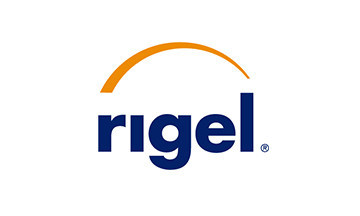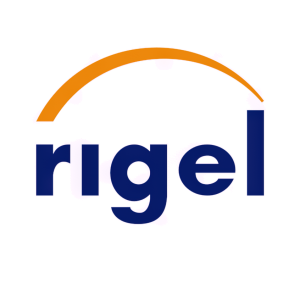Rigel Announces Publication of Final 5-year Data on REZLIDHIA® (olutasidenib) in Patients with R/R mIDH1 AML in the Journal of Hematology & Oncology
Rhea-AI Summary
Rigel (NASDAQ: RIGL) published final five-year results from the Phase 2 pivotal cohort of REZLIDHIA (olutasidenib) in relapsed/refractory mIDH1 acute myeloid leukemia in Journal of Hematology & Oncology on Nov 17, 2025. Key five-year findings: CR/CRh 35% (n=147) with median duration 25.3 months, ORR 48% with median duration 15.5 months, and overall median OS 11.5 months. Safety remained consistent with no new signals or new cases of differentiation syndrome reported.
Subgroup: patients with 1–2 prior regimens showed higher response rates and longer OS versus ≥3 prior regimens; 12 patients R/R to venetoclax had 33% CR/CRh and median OS 16.2 months.
Positive
- Complete remission (CR/CRh) rate 35% (n=147)
- Median CR/CRh duration 25.3 months
- Overall response rate (ORR) 48%; median response duration 15.5 months
- No new safety signals or new differentiation syndrome cases at five years
Negative
- Overall median overall survival (OS) was 11.5 months
- Patients with ≥3 prior regimens had lower CR/CRh 24% and median OS 8.9 months
- Hepatotoxicity noted historically: 23% of patients experienced hepatotoxicity (13% grade 3/4)
News Market Reaction
On the day this news was published, RIGL gained 1.36%, reflecting a mild positive market reaction. Argus tracked a peak move of +3.7% during that session. Our momentum scanner triggered 33 alerts that day, indicating elevated trading interest and price volatility. This price movement added approximately $11M to the company's valuation, bringing the market cap to $841M at that time.
Data tracked by StockTitan Argus on the day of publication.
- Olutasidenib continued to demonstrate durable efficacy and a manageable safety profile in a broad range of patients with R/R mIDH1 AML, including those previously treated with venetoclax-based regimens
- Rigel advances its strategic collaborations to further evaluate olutasidenib with the activation of a fifth study with MD Anderson and enrollment of the first patient in the CONNECT TarGeT-D study
The publication reports the final follow-up analysis of the registrational Phase 2 trial, with an additional two years of efficacy and safety data. These five-year data further support the durable responses and manageable safety profile observed with olutasidenib in patients with R/R mIDH1 AML, including those R/R to prior venetoclax. The safety profile remained consistent with what was previously reported, with no new safety signals identified.
"Since its launch, olutasidenib has become an important treatment option for patients with relapsed or refractory mIDH1 AML due to its clinical activity and durable responses, including patients previously treated with venetoclax who have particularly poor outcomes," said Jorge E. Cortes, M.D., Phase 2 trial investigator and Director, Georgia Cancer Center, Cecil F. Whitaker Jr., GRA Eminent Scholar Chair in Cancer. "These incremental data support earlier findings and provide additional insights that further enhance the opportunity for olutasidenib to positively impact the outcome of patients with mIDH1 AML."
"This long-term final analysis of olutasidenib reinforces the potential for olutasidenib in mIDH1 AML," said Lisa Rojkjaer, M.D, Rigel's chief medical officer. "The data to date demonstrates clinical benefit across a range of patients and underscores the importance of maintaining therapy for at least 6 months in the absence of toxicity or disease progression to optimize the ability to achieve a response."
Additional key points from the paper include:
- For the overall population, the five-year safety profile of olutasidenib remained consistent, with no new safety signals identified compared to the three-year analysis, and no new cases of differentiation syndrome reported.
- Of 147 efficacy evaluable patients, complete remission (CR) or CR with partial hematologic recovery (CRh) was achieved in
35% . The median duration of CR/CRh was 25.3 months. Overall response rate (ORR) was48% , with median duration of 15.5 months. Median overall survival (OS) was 11.5 months. - Transfusion independence (for ≥56 days) from red blood cells was achieved in 34 patients (
39% ) who were dependent at baseline and for platelets was achieved in 28 patients (41% ) who were dependent at baseline. - Among the 71 patients who achieved an overall response,
66% of patients achieved a response within 2 months,24% required 2 to 4 months to respond and10% required at least 4.6 (up to 10.2) months of therapy to achieve a response. Median OS was 32.7 months. - Patients with one to two prior regimens had a higher CR/CRh rate (
41% ), ORR (54% ), and longer median OS (13 months) compared to those with ≥3 prior regimens (CR/CRh:24% ; ORR:39% ; median OS: 8.9 months). - In the 12 patients that were R/R to prior venetoclax,
33% achieved a CR/CRh; median duration of CR/CRh was not reached (3 patients ongoing at 22.6, 36.9 and 50.6 months), and median OS was 16.2 months.
The publication, titled "Olutasidenib for Mutated IDH1 Acute Myeloid Leukemia: Final Five-Year Results From the Phase 2 Pivotal Cohort," was published online and can be found here.
Rigel is also evaluating olutasidenib in other disease areas where mIDH1 plays a role. The company has strategic collaborations with The University of Texas MD Anderson Cancer Center (MD Anderson) and CONNECT, an international collaborative network of pediatric neuro-oncology centers. Latest updates include:
- In September, the fifth study under the strategic alliance between Rigel and MD Anderson opened for enrollment. This Phase 2 multi-arm, multi-center, open-label, non-randomized clinical study will evaluate olutasidenib in combination with co-targeted therapies in patients with R/R IDH1-mutated myeloid malignancies harboring activated signaling pathway mutations (NCT07032727). The primary objectives of the study are to evaluate safety and the composite complete remission rate.
- In October, the first patient was enrolled in the CONNECT Phase 2 TarGeT-D study evaluating olutasidenib in combination with temozolomide, followed by olutasidenib monotherapy as a maintenance regimen for newly-diagnosed adolescent and young adult patients with a high-grade glioma harboring an IDH1 mutation (NCT06161974).
About AML
Acute myeloid leukemia (AML) is a rapidly progressing cancer of the blood and bone marrow that affects myeloid cells, which normally develop into various types of mature blood cells. AML occurs primarily in adults and accounts for about 1 percent of all adult cancers. The American Cancer Society estimates that there will be about 22,010 new cases in
Relapsed AML affects about half of all patients who, following treatment and remission, experience a return of leukemia cells in the bone marrow.2,3 Refractory AML, which affects between 10 and 40 percent of newly diagnosed patients, occurs when a patient fails to achieve remission even after intensive treatment.4 Quality of life declines for patients with each successive line of treatment for AML, and well-tolerated treatments in relapsed or refractory disease remain an unmet need.
About REZLIDHIA®
INDICATION
REZLIDHIA is indicated for the treatment of adult patients with relapsed or refractory acute myeloid leukemia (AML) with a susceptible isocitrate dehydrogenase-1 (IDH1) mutation as detected by an FDA-approved test.
IMPORTANT SAFETY INFORMATION
|
WARNING: DIFFERENTIATION SYNDROME Differentiation syndrome, which can be fatal, can occur with REZLIDHIA treatment. Symptoms may include dyspnea, pulmonary infiltrates/pleuropericardial effusion, kidney injury, hypotension, fever, and weight gain. If differentiation syndrome is suspected, withhold REZLIDHIA and initiate treatment with corticosteroids and hemodynamic monitoring until symptom resolution. |
WARNINGS AND PRECAUTIONS
Differentiation Syndrome
REZLIDHIA can cause differentiation syndrome. In the clinical trial of REZLIDHIA in patients with relapsed or refractory AML, differentiation syndrome occurred in
If differentiation syndrome is suspected, temporarily withhold REZLIDHIA and initiate systemic corticosteroids (e.g., dexamethasone 10 mg IV every 12 hours) for a minimum of 3 days and until resolution of signs and symptoms. If concomitant leukocytosis is observed, initiate treatment with hydroxyurea, as clinically indicated. Taper corticosteroids and hydroxyurea after resolution of symptoms. Differentiation syndrome may recur with premature discontinuation of corticosteroids and/or hydroxyurea treatment. Institute supportive measures and hemodynamic monitoring until improvement; withhold dose of REZLIDHIA and consider dose reduction based on recurrence.
Hepatotoxicity
REZLIDHIA can cause hepatotoxicity, presenting as increased alanine aminotransferase (ALT), increased aspartate aminotransferase (AST), increased blood alkaline phosphatase, and/or elevated bilirubin. Of 153 patients with relapsed or refractory AML who received REZLIDHIA, hepatotoxicity occurred in
Monitor patients frequently for clinical symptoms of hepatic dysfunction such as fatigue, anorexia, right upper abdominal discomfort, dark urine, or jaundice. Obtain baseline liver function tests prior to initiation of REZLIDHIA, at least once weekly for the first two months, once every other week for the third month, once in the fourth month, and once every other month for the duration of therapy. If hepatic dysfunction occurs, withhold, reduce, or permanently discontinue REZLIDHIA based on recurrence/severity.
ADVERSE REACTIONS
The most common (≥
DRUG INTERACTIONS
- Avoid concomitant use of REZLIDHIA with strong or moderate CYP3A inducers.
- Avoid concomitant use of REZLIDHIA with sensitive CYP3A substrates unless otherwise instructed in the substrates prescribing information. If concomitant use is unavoidable, monitor patients for loss of therapeutic effect of these drugs.
LACTATION
Advise women not to breastfeed during treatment with REZLIDHIA and for 2 weeks after the last dose.
GERIATRIC USE
No overall differences in effectiveness were observed between patients 65 years and older and younger patients. Compared to patients younger than 65 years of age, an increase in incidence of hepatotoxicity and hypertension was observed in patients ≥65 years of age.
HEPATIC IMPAIRMENT
In patients with mild or moderate hepatic impairment, closely monitor for increased probability of differentiation syndrome.
Click here for Important Safety Information and Full Prescribing Information, including Boxed WARNING.
To report side effects of prescription drugs to the FDA, visit www.fda.gov/medwatch or call 1-800-FDA-1088 (800-332-1088).
REZLIDHIA is a registered trademark of Rigel Pharmaceuticals, Inc.
About Rigel
Rigel Pharmaceuticals, Inc. (Nasdaq: RIGL) is a biotechnology company dedicated to discovering, developing and providing novel therapies that significantly improve the lives of patients with hematologic disorders and cancer. Founded in 1996, Rigel is based in
- The American Cancer Society. Key Statistics for Acute Myeloid Leukemia (AML). Revised March 4, 2025. Accessed September 30, 2025: https://www.cancer.org/cancer/acute-myeloid-leukemia/about/key-statistics.html
- Patel, A, et al. Outcomes of Patients With Acute Myeloid Leukemia Who Relapse After 5 Years of Complete Remission. 2021 Sep 7;28(7):811-814. doi: https://doi.org/10.3727/096504020X15965357399750
- Thol F, Ganser, A. Treatment of Relapsed Acute Myeloid Leukemia. Curr. Treat. Options on Oncol. (2020) 21: 66. doi: https://doi.org/10.1007/s11864-020-00765-5
- Thol F, Schlenk RF, Heuser M, Ganser A. How I treat refractory and early relapsed acute myeloid leukemia. Blood (2015) 126 (3): 319-27. doi: https://doi.org/10.1182/blood-2014-10-551911
Forward-Looking Statements
This press release contains forward-looking statements relating to, among other things, the durable efficacy and manageable safety profile of olutasidenib in patients with R/R mIDH1 AML, including those previously treated with venetoclax, and its opportunity to positively impact the outcome of patients, as well as the potential benefits of olutasidenib in high-grade glioma harboring an IDH1 mutation, and in R/R IDH1-mutated myeloid malignancies. Any statements contained in this press release that are not statements of historical fact may be deemed to be forward-looking statements. Forward-looking statements can be identified by words such as "
anticipates", "
plan", "
outlook", "
potential", "may", "look to", "expects", "will
", "initial", "promising", "continue", "impact", and similar expressions in reference to future periods. Forward-looking statements are neither historical facts nor assurances of future performance. Instead, they are based on Rigel's current beliefs, expectations, and assumptions and hence they inherently involve significant risks, uncertainties and changes in circumstances that are difficult to predict and many of which are outside of our control. Therefore, you should not rely on any of these forward-looking statements. Actual results and the timing of events could differ materially from those anticipated in such forward looking statements as a result of these risks and uncertainties, which include, without limitation, risks and uncertainties associated with the commercialization and marketing of olutasidenib; risks that the FDA, European Medicines Agency, PMDA or other regulatory authorities may make adverse decisions regarding olutasidenib; risks that clinical trials may not be predictive of real-world results or of results in subsequent clinical trials; risks that olutasidenib may have unintended side effects, adverse reactions or incidents of misuses; the availability of resources to develop Rigel's product candidates; market competition; as well as other risks detailed from time to time in Rigel's reports filed with the Securities and Exchange Commission, including its most recent Annual Report on Form 10-K, and subsequent filings, including Quarterly Reports on Form 10-Q. Any forward-looking statement made by us in this press release is based only on information currently available to us and speaks only as of the date on which it is made. Rigel does not undertake any obligation to update forward-looking statements, whether written or oral, that may be made from time to time, whether as a result of new information, future developments or otherwise, and expressly disclaims any obligation or undertaking to release publicly any updates or revisions to any forward-looking statements contained herein, except as required by law.
Contact for Investors & Media:
Investors:
Rigel Pharmaceuticals, Inc.
650.624.1232
ir@rigel.com
Media:
David Rosen
Argot Partners
646.461.6387
david.rosen@argotpartners.com
![]() View original content to download multimedia:https://www.prnewswire.com/news-releases/rigel-announces-publication-of-final-5-year-data-on-rezlidhia-olutasidenib-in-patients-with-rr-midh1-aml-in-the-journal-of-hematology--oncology-302616427.html
View original content to download multimedia:https://www.prnewswire.com/news-releases/rigel-announces-publication-of-final-5-year-data-on-rezlidhia-olutasidenib-in-patients-with-rr-midh1-aml-in-the-journal-of-hematology--oncology-302616427.html
SOURCE Rigel Pharmaceuticals, Inc.








